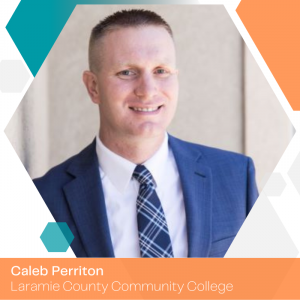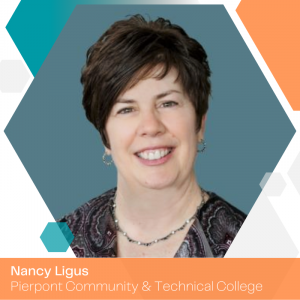The Connecticut State Department of Education has named Kyllie Freeman as the State Director of Career Technical Education. The Department oversees all secondary and postsecondary Career Technical Education (CTE) programs as well as CTE for justice-connected individuals and youth and pre-apprenticeship programs.
 Kyllie discovered her passion for CTE in the classroom as a culinary instructor of 15 years and fondly recalls seeing her high school learners’ “faces [light up] when they made something” as they gained valuable skills in her classes. “Some [learners] hadn’t even washed a dish before.”
Kyllie discovered her passion for CTE in the classroom as a culinary instructor of 15 years and fondly recalls seeing her high school learners’ “faces [light up] when they made something” as they gained valuable skills in her classes. “Some [learners] hadn’t even washed a dish before.”
Originally a nutritionist major in college, Kyllie switched to culinary arts to continue a career connected to food and nutrition without the intense focus on math and science. During her teaching tenure, Kyllie worked on her district’s grant for the Strengthening Career Technical Education for the 21st Century Act (Perkins V) which led to her taking a Perkins Grant Manager role at the state level. Kyllie oversaw the Hospitality and Tourism and the Information Technology, Education and Training Clusters®, explaining “I wanted to keep supporting Perkins but in a different role. ”
In her new role as State Director, Kyllie is excited to increase partnerships, aligning school districts, community colleges and industry partners to increase accessibility to high-quality CTE and success for learners across Connecticut.
In the year ahead, Kyllie is focused on supporting districts by remapping CTE School Courses for the Exchange of Data (SCED) codes to better align with the National Career Clusters Framework®, giving districts more flexibility in how they award credit. Kyllie is excited to offer technical assistance to district administrators to facilitate this process.
Kyllie is also focused on helping learners know more about the college and career opportunities available to them through CTE. She plans to accomplish this by better aligning course selection with learner interests. Kyllie will also support learners by updating the Student Success Plan and embedding CTE into the plan for better alignment with the opportunities available to learners.
One of the biggest challenges for CTE in Connecticut, teacher recruitment and retention, is not unique to the state; it is a national issue. The availability of qualified teachers in a particular pathway dictates where certain courses can be offered, thereby limiting course offerings for learners where teachers are in short supply.
In addition to addressing the top challenge of CTE instructor recruitment and retention, an issue facing CTE programs nationwide, Kyllie would also like to help change the perception of who should be participating in CTE. This shift would raise awareness that learners should be focused on college and career readiness, not just readiness for college. “CTE is huge and so many [skills] are transferrable.”
Coming from a long line of restaurant owners, Kyllie loves cooking outside of her State Director role. While she will “cook anything,” Kyllie enjoys cooking Italian food the most. Outside of the kitchen, Kyllie enjoys kayaking.
Welcome Kyllie to Advance CTE!
Jodi Langellotti, Communications Associate


 After struggling academically as an undergraduate at a liberal arts college and unsure of his future, Karl Ohrn joined the United States Air Force, ultimately serving 30 years. It was in the Air Force that Karl had his first exposure to Career Technical Education (CTE).
After struggling academically as an undergraduate at a liberal arts college and unsure of his future, Karl Ohrn joined the United States Air Force, ultimately serving 30 years. It was in the Air Force that Karl had his first exposure to Career Technical Education (CTE). Caleb Perriton’s career began in the automotive industry as an international trainer prior to entering the world of postsecondary CTE. Currently, he serves as Program Director of the Trades & Technical Studies Pathway at Laramie County Community College. He is an ASE Certified Master Automotive Technician and earned a bachelor’s degree in automotive technology from Weber State University and master’s degree in business administration from the University of Wyoming.
Caleb Perriton’s career began in the automotive industry as an international trainer prior to entering the world of postsecondary CTE. Currently, he serves as Program Director of the Trades & Technical Studies Pathway at Laramie County Community College. He is an ASE Certified Master Automotive Technician and earned a bachelor’s degree in automotive technology from Weber State University and master’s degree in business administration from the University of Wyoming.  Dr. Luv’Tesha Robertson
Dr. Luv’Tesha Robertson  Daniel Sandoval is passionate about cultivating self-reliance among learners and students from marginalized populations and has focused on serving immigrant, economically disadvantaged, racially underrepresented and linguistically diverse communities. His range of experience includes grant writing and administration, managing apprenticeship and credential attainment initiatives, and serving in leadership roles in postsecondary student services. Currently, Sandoval serves as the Director of Customized Training and Apprenticeships at Pickens Technical College and as a Psychology instructor at the Community College of Aurora. He earned a bachelor’s degree in English writing from Colorado Mesa University and a master’s degree in counseling psychology from the University of Colorado at Denver.
Daniel Sandoval is passionate about cultivating self-reliance among learners and students from marginalized populations and has focused on serving immigrant, economically disadvantaged, racially underrepresented and linguistically diverse communities. His range of experience includes grant writing and administration, managing apprenticeship and credential attainment initiatives, and serving in leadership roles in postsecondary student services. Currently, Sandoval serves as the Director of Customized Training and Apprenticeships at Pickens Technical College and as a Psychology instructor at the Community College of Aurora. He earned a bachelor’s degree in English writing from Colorado Mesa University and a master’s degree in counseling psychology from the University of Colorado at Denver.  Milo path to finding his career passion began with experiences that we hope for all Career Technical Education (CTE) learners —- career exploration, robust high school CTE classes and work-based learning that led to a decades-long passion for education and providing more opportunities for students.
Milo path to finding his career passion began with experiences that we hope for all Career Technical Education (CTE) learners —- career exploration, robust high school CTE classes and work-based learning that led to a decades-long passion for education and providing more opportunities for students. Dr. Angela Lawhorne
Dr. Angela Lawhorne Nancy Ligus leverages her
Nancy Ligus leverages her  Leisa Mathews’
Leisa Mathews’  Hello! My name is Suela Cela and I am excited to be joining Advance CTE as Senior Policy Associate. In this role, I will be supporting Advance CTE in various projects to advance equity and access in Career Technical Education (CTE), including the Opportunity Gap Analysis workshop and pilot, the College in the High School Alliance partnership and launching an initiative focused on the use of stimulus funds for CTE.
Hello! My name is Suela Cela and I am excited to be joining Advance CTE as Senior Policy Associate. In this role, I will be supporting Advance CTE in various projects to advance equity and access in Career Technical Education (CTE), including the Opportunity Gap Analysis workshop and pilot, the College in the High School Alliance partnership and launching an initiative focused on the use of stimulus funds for CTE.  Before becoming the State CTE Director for Alaska, Deborah Riddle was a teacher. She taught math, Family and Consumer Sciences (FACS) and robotics in rural Montana. During her time as a teacher, she worked closely with high school teachers to create alignment between middle school and high school. After receiving an administrative certificate to become a principal, she decided to move back home to Alaska. Deborah became a School Improvement Title I Specialist before beginning her work in Career Technical Education (CTE).
Before becoming the State CTE Director for Alaska, Deborah Riddle was a teacher. She taught math, Family and Consumer Sciences (FACS) and robotics in rural Montana. During her time as a teacher, she worked closely with high school teachers to create alignment between middle school and high school. After receiving an administrative certificate to become a principal, she decided to move back home to Alaska. Deborah became a School Improvement Title I Specialist before beginning her work in Career Technical Education (CTE). Before becoming the Chancellor of West Virginia’s Community and Technical College System (WVCTCS), Dr. Tucker was a self-proclaimed “data geek” who worked in policy and planning. Dr. Tucker analyzed data that examined who was attending college, who wasn’t and what happened to students once they arrived at college. From that work, Dr. Tucker soon realized that West Virginia’s state workforce needs would not be met if low graduation rates persisted. Dr. Tucker applied for and received a grant that allowed her to play a role in revamping the state’s approach to development education, which resulted in a full scale corequisite redesign of remedial education. As Chancellor of the of the WVCTCS, and now Interim Chancellor of the state’s four-year system of higher education, Dr. Tucker has played a key role in promoting high-quality Career Technical Education (CTE) programs.
Before becoming the Chancellor of West Virginia’s Community and Technical College System (WVCTCS), Dr. Tucker was a self-proclaimed “data geek” who worked in policy and planning. Dr. Tucker analyzed data that examined who was attending college, who wasn’t and what happened to students once they arrived at college. From that work, Dr. Tucker soon realized that West Virginia’s state workforce needs would not be met if low graduation rates persisted. Dr. Tucker applied for and received a grant that allowed her to play a role in revamping the state’s approach to development education, which resulted in a full scale corequisite redesign of remedial education. As Chancellor of the of the WVCTCS, and now Interim Chancellor of the state’s four-year system of higher education, Dr. Tucker has played a key role in promoting high-quality Career Technical Education (CTE) programs. One of the strengths of Hawai’i’s CTE system is its access to the longitudinal data system, the
One of the strengths of Hawai’i’s CTE system is its access to the longitudinal data system, the  There is growing enthusiasm for CareerTech in Oklahoma, spurred in part by Gov. Mary Fallin’s
There is growing enthusiasm for CareerTech in Oklahoma, spurred in part by Gov. Mary Fallin’s